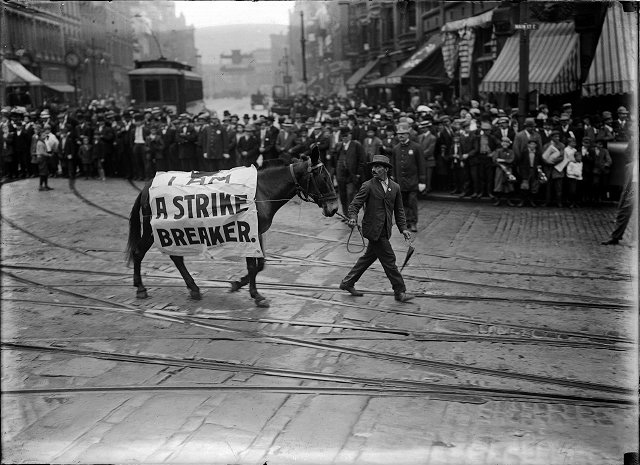 Scab is a pretty emotive term, as well as a nasty thing to have. Strikebreakers, scabs, and blacklegs of all kinds have been demonized in the tradition and folklore of organized labor for centuries, as turncoats and betrayers of their own kind. And now we have one academic writer claiming that writers who write for free are scabs.
Scab is a pretty emotive term, as well as a nasty thing to have. Strikebreakers, scabs, and blacklegs of all kinds have been demonized in the tradition and folklore of organized labor for centuries, as turncoats and betrayers of their own kind. And now we have one academic writer claiming that writers who write for free are scabs.
Yasmin Nair, writer, academic, activist, and commentator, wrote her original piece under the emphatic title “Scabs: Academics and Others Who Write for Free.” And she does at least know whereof she speaks: “Over the years, I’ve steadily embarked upon a career of freelance writing, and the bulk of my livelihood comes from writing.” This is her argument, though:
Those who write for free or very little simply because they can afford to are scabs. This would include not just academics with tenured or tenure-track positions, but adjuncts, professionals (like paid activists and organisers), as well as, really, just about anyone who writes for places like Guernica, The Huffington Post, open Democracy.net, and The Rumpus (and this is a very, very tiny list) … My use of the word “scab” is often met with a range of responses from irritation to blind fury … But what is neoliberalism if not the rationalisation of capitalist exploitation under the rubric of “choice”? … When someone offers to write for free or a negligible amount, it allows a publication to further downgrade pay scales for working writers or to even refuse to pay them at all… The system of free writing has created a caste system, with those who can afford to work for free doing so while those who can’t struggling to pay the bills and often giving up.
Needless to say, comment like that attracted some backlash – not for the criticism of publications that want writers to work for nothing, but for the use of the scab epithet. And Nair’s response to it is here, where, among other things, she insists that “writers who can afford to produce such work for free are steeped in massive privilege in comparison to the writers who only write for a living,” and that: “As for the word ‘scab’ itself: I’m fully aware of its historical meaning. But let’s not all now pretend that ‘scab’ can and only does mean one thing for all of history.”
This debate goes well beyond the artificial hothouse climate of academia and academic writing, and concerns over writing that challenges the “neoliberal order.” Not only are many journals pushing for writers to contribute for free, more and more self-published and independent writers are using freebie offers and giveaways as sales and promotional tactics. And some writers, especially the kind who went through the traditional mill of print publishing, are going to, and do, complain about others giving away work for free and undermining their sales.
There’s one fundamental flaw in the equation of the latter with the scab argument, though. Writers are not workers. They do not toil for an employer in return for a given wage. They are independent tradespeople, vendors of a product. If you like, they are far closer to classic Marxist petit bourgeois than to proletarian toilers who don’t own their own means of production or have control of their product. Is Project Gutenberg a scab platform because it distributes literature for free? So aside from being gratuitously offensive, the scab tag just does not apply.
Oh, and by the way, TeleRead pays me per article, and I get paid in kind in the form of review books too. So I’m no scab. But I bet Nair didn’t get paid for her blog post. Does that make her one?

































The crux of the issue is that thanks to computers and the internet there are almost no barriers to becoming a “writer” and moreover because of people’s increasing cognitive surplus there is an increasing amount of free cycles out there in which people choose to write for non-monetary benefits. Artisans who create work for free are no more scabs than people who perform their own domestic chores that used to be outsourced to maids and butlers.
The creative class needs to realize that humans have a need to create like they have a need to eat. As modern technology puts the tools of creation in more and more hands the price of creation is going to drop, in many cases to free. Instead of bellyaching like a 1980’s steel worker, writers need to face facts that their profession is no longer sustainable in the way it once was and plan accordingly.
The decreased cost of writing is a good thing for society at large because never in human history has more content been written. The good of the many outweighs the good of the few.
Scabs are a Union problem. We’re not unionized and therefore we don’t have the concept of scabs.
People will pay what they think is good value. For my part, the free books are marketing, so I’m not planning to stop writing for free so someone can charge what they want for writing.